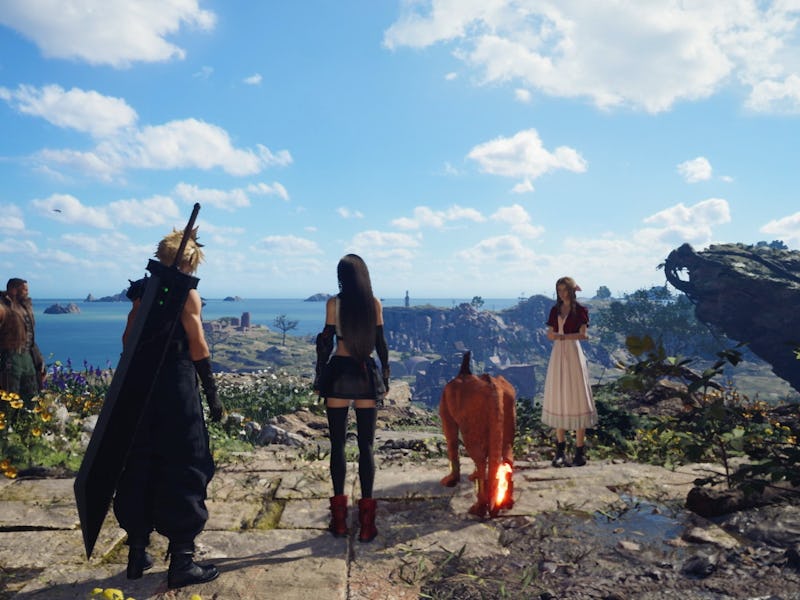FF7 Rebirth Slow Sales Could Prompt A Major Shift
The rebirth of indies at Square Enix.

Square Enix’s Final Fantasy 7 Rebirth is one of the biggest games of the year, with its divisive open world and puzzling final hour dominating questions for weeks. Coming on the heels of the hit Final Fantasy 7 Remake, it’s natural to assume that Rebirth would be an easy win for Square Enix. But according to one analyst, its sales may not have stacked up, and that has me both worried and hopeful about the publisher’s recent shift in strategy.
Final Fantasy 7 Rebirth only sold around half of what Remake did shortly after release, according to Daniel Ahmad, director of research and insights at Niko Partners. “It's selling about half of what Remake sold in the same timeframe and looks like it'll have a weaker tail (prior to any PS+-like release),” Ahmad said on social media.
Data from Ampere Analysis show that Rebirth peaked at 2.2 million daily active users between its launch and April 10. While that data doesn’t represent every sale, it does suggest that the game’s sales were behind the 3.5 million copies that Square Enix reported Final Fantasy 7 Remake sold just in its first three days.
It was always safe to assume that Final Fantasy 7 Rebirth would sell fewer copies than Remake. The sequel’s story would be tough to follow for anyone who never played the first part, and naturally some players who didn’t care for Remake would drop off for the next game. But if its sales are actually only half of Remake, that could spell trouble for its publisher.
Earlier this year, Square Enix confirmed a shift in its strategy that could result in it publishing fewer games.
“We want to concentrate our development resources on carefully selected new titles that we will develop to a high level of quality,” Square Enix president Takashi Kiryu said in a financial report. To achieve that, Square Enix could be moving away from mid-budget titles like Harvestella and Valkyrie Elysium, which were released in recent years to relatively little fanfare.
Relying too heavily on Final Fantasy may be costing Square Enix.
“The market is increasingly polarized between blockbuster and indie titles, but I feel that we have developed many titles that fell somewhere in the middle,” Kiryu said. “I want to make clearer distinctions going forward.”
That strategy makes sense if Square Enix can put out surefire blockbuster hits while launching successful, cheaper-to-make indie games, but unfortunately there’s no such thing as a surefire hit. If games as large and expensive as Final Fantasy 7 Rebirth fall behind Square Enix’s expectations, that could be dangerous for the publisher without mid-budget titles to fall back on. Kiryu specifically points out Square’s success with indie title Powerwash Simulator, but games of that size can’t make up for disappointing performance from tentpole games.
Lackluster Rebirth sales don’t necessarily mean Square Enix is doomed, though. Despite saying the publisher would focus on fewer releases, Kiryu also said this year that it’s aiming for greater diversity in its games. That sounds somewhat contradictory, but he explains that Square Enix has been “overly reliant” on its biggest series, Final Fantasy and Dragon Quest. While faltering sales for a tentpole title would hurt any publisher, disappointing performance from Final Fantasy 7 Rebirth could be proof that Square Enix needs to rely less on the success of its biggest games. If even Final Fantasy isn’t a guaranteed success, it makes sense that the publisher would shift its attention to games as far from its famed RPG series as Powerwash Simulator.
Square Enix’s strategy shift could put more attention on smaller games like Paranormasight.
Square Enix has in fact been experimenting with titles outside its established series for the past few years. Octopath Traveler is something of a revival of old-school turn-based Final Fantasy, but without the recognizable name and with some fantastic twists on combat. Titles like Diofield Chronicle and Forspoken explored twists on tactical and action RPGs, respectively. Paranormasight is a visual novel that was released to critical acclaim.
While none of these games reached Final Fantasy-level success, that could change if Square Enix really does want to focus more on games outside of its biggest franchises. If the publisher really intends on diversifying the games it’s offering, the easiest solution seems to be to give more resources to developers already working on its most original titles so they can make the best versions of them. As much as lackluster sales for Final Fantasy 7 Rebirth might sting, getting a wider variety of games from Square Enix can only be a good thing for the players.
Update, April 24: Daniel Ahmad responded to Inverse’s request for comment after publication to clarify, “Sales fell off sharply after the first week.”
“Square Enix may turn to deep discounting, a release on PS+, and a greater marketing effort for the PC release to shift more copies and reach a larger player base,” Ahmad added.
However, he doesn’t expect Final Fantay VII Rebirth’s sales to affect the scope of its eventual sequel. Instead, he says, “it could lead to Square Enix reconsidering its approach to how it handles direct sequels that are reliant on a prior prior base buying the new title.”